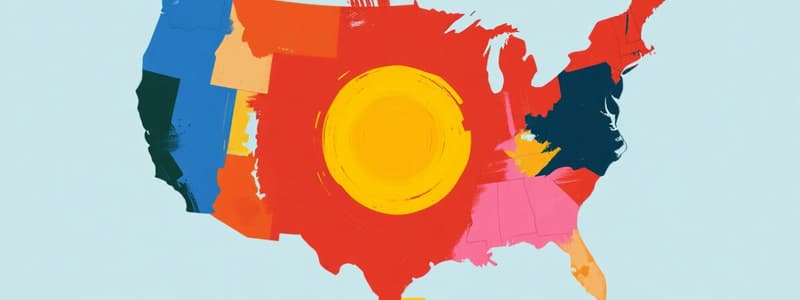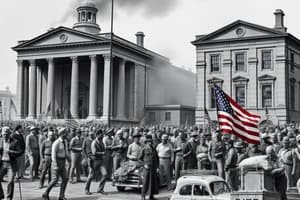Podcast
Questions and Answers
Which founding father is known for authoring the Declaration of Independence?
Which founding father is known for authoring the Declaration of Independence?
- George Washington
- Thomas Jefferson (correct)
- Benjamin Franklin
- James Madison
Who was the President of the Confederacy during the Civil War?
Who was the President of the Confederacy during the Civil War?
- Jefferson Davis (correct)
- Ulysses S. Grant
- Robert E. Lee
- Abraham Lincoln
Which legislative act abolished slavery in the United States?
Which legislative act abolished slavery in the United States?
- Constitution of 1787
- Voting Rights Act of 1965
- Emancipation Proclamation (correct)
- Civil Rights Act of 1964
What was a significant outcome of the Progressive Era leaders like Theodore Roosevelt and Woodrow Wilson?
What was a significant outcome of the Progressive Era leaders like Theodore Roosevelt and Woodrow Wilson?
Which 20th century leader was involved in establishing the New Deal?
Which 20th century leader was involved in establishing the New Deal?
What historical thinking skill involves understanding cause-and-effect relationships?
What historical thinking skill involves understanding cause-and-effect relationships?
What method involves creating structured outlines to organize key information?
What method involves creating structured outlines to organize key information?
What is the primary goal of note-taking during lectures?
What is the primary goal of note-taking during lectures?
What was a significant motivator for European exploration during the early colonial period?
What was a significant motivator for European exploration during the early colonial period?
Which document is primarily associated with the establishment of American independence?
Which document is primarily associated with the establishment of American independence?
What concept describes the belief that the United States was destined to expand across the North American continent?
What concept describes the belief that the United States was destined to expand across the North American continent?
Which of the following is considered a key theme in the 20th Century America period?
Which of the following is considered a key theme in the 20th Century America period?
What was a primary focus of the Progressive Era?
What was a primary focus of the Progressive Era?
What economic development is associated with the Gilded Age?
What economic development is associated with the Gilded Age?
What played a significant role in shaping American identity throughout history?
What played a significant role in shaping American identity throughout history?
Which of the following best represents American foreign policy after World War II?
Which of the following best represents American foreign policy after World War II?
Flashcards
Founding Fathers
Founding Fathers
A group of influential figures like George Washington and Thomas Jefferson who played pivotal roles in establishing the foundations of the United States.
Progressive Era
Progressive Era
The period of significant social and political reforms in the early 20th century, led by figures like Theodore Roosevelt and Woodrow Wilson.
Historical Causation
Historical Causation
The examination of historical events and developments to identify how they connect to one another and contribute to a broader understanding of history.
Primary Source Analysis
Primary Source Analysis
Signup and view all the flashcards
Contextualization
Contextualization
Signup and view all the flashcards
Interpretation and Sourcing
Interpretation and Sourcing
Signup and view all the flashcards
Change and Continuity
Change and Continuity
Signup and view all the flashcards
Historical Synthesis
Historical Synthesis
Signup and view all the flashcards
Exploration and Colonization
Exploration and Colonization
Signup and view all the flashcards
Revolution and Early Republic
Revolution and Early Republic
Signup and view all the flashcards
19th Century Expansion and Reform
19th Century Expansion and Reform
Signup and view all the flashcards
20th Century America
20th Century America
Signup and view all the flashcards
American Identity
American Identity
Signup and view all the flashcards
Economic Development
Economic Development
Signup and view all the flashcards
Social Structures and Inequalities
Social Structures and Inequalities
Signup and view all the flashcards
Political Systems
Political Systems
Signup and view all the flashcards
Study Notes
Overview of AP US History
- AP US History covers the history of the United States from its colonization to the present.
- The course emphasizes key themes like political, social, economic, and cultural developments.
- Students analyze primary and secondary sources to understand historical events.
- Critical thinking and historical analysis are essential skills in the course.
- The challenging course prepares students for college-level history courses.
Key Periods and Themes
- Exploration and Colonization: European motivations for exploration; establishment of colonies like Jamestown and Plymouth; early colonial economies and social structures.
- Revolution and Early Republic: Causes of the American Revolution; Declaration of Independence; Constitution; early political parties; and development of national identity.
- 19th Century Expansion and Reform: Westward expansion; Manifest Destiny; sectionalism; the Civil War; Reconstruction; industrialization; and social reform movements.
- 20th Century America: World Wars; Great Depression; Civil Rights Movement; Cold War; and the rise of American global power.
- Progressive Era: Reforms in government and society; social justice and equality movements and their effects.
- The Gilded Age: Industrialization and urbanization; rise of large corporations and monopolies; and the resulting social and economic inequalities.
Key Concepts
- American Identity: How American identity developed and changed over time through immigration, westward expansion, wars, and technological advancements.
- Economic Development: How different economic systems (agriculture, industry, technology, finance) shaped American society and culture.
- Social Structures and Inequalities: The impact of race, gender, class, region, and religion on American society and power dynamics.
- Political Systems: Evolution of government, political parties, and movements for change (e.g., abolitionism, suffrage).
- Cultural and Intellectual Trends: How art, literature, religion, and philosophy influenced American culture.
- Foreign Policy: American involvement in global affairs, from isolationism to interventionism.
Key Individuals and Events
- Founding Fathers: George Washington, Thomas Jefferson, James Madison, and others shaped the nation.
- Civil War Leaders: Abraham Lincoln, Jefferson Davis, Ulysses S. Grant, Robert E. Lee, and their roles in the pivotal Civil War.
- Progressive Era Leaders: Theodore Roosevelt, Woodrow Wilson; their impact on social and political reforms.
- 20th Century Leaders: Franklin D. Roosevelt, Harry S. Truman, John F. Kennedy; their effect on American society and the world.
- Major Wars and Conflicts: Revolutionary War, War of 1812, Mexican-American War, World War I, World War II, Cold War, Vietnam War.
- Significant Legislation: The Constitution, amendments, major legislation (e.g., Emancipation Proclamation, Civil Rights Act of 1964, Voting Rights Act of 1965).
Historical Thinking Skills
- Historical Causation: Understanding cause-and-effect relationships in historical events.
- Comparison and Contextualization: Assessing historical situations and events within a broader historical context.
- Interpretation and Sourcing: Critical evaluation of historical evidence and different perspectives.
- Change and Continuity: Understanding how historical events build upon previous developments.
- Synthesis: Combining diverse historical information to draw broader conclusions.
Studying Strategies
- Outlining: Organizing key information and concepts in each historical period.
- Note-Taking: Developing a structured system for concise notes from lectures and readings.
- Primary Source Analysis: Developing skills to interpret primary sources and form your own conclusions.
- Review and Repetition: Revising notes and concepts to reinforce understanding.
Studying That Suits You
Use AI to generate personalized quizzes and flashcards to suit your learning preferences.




